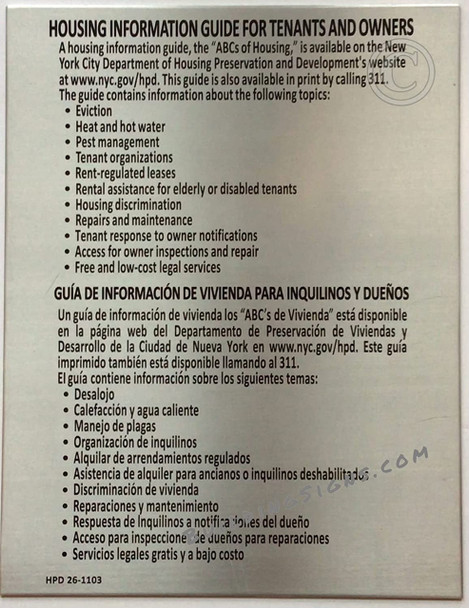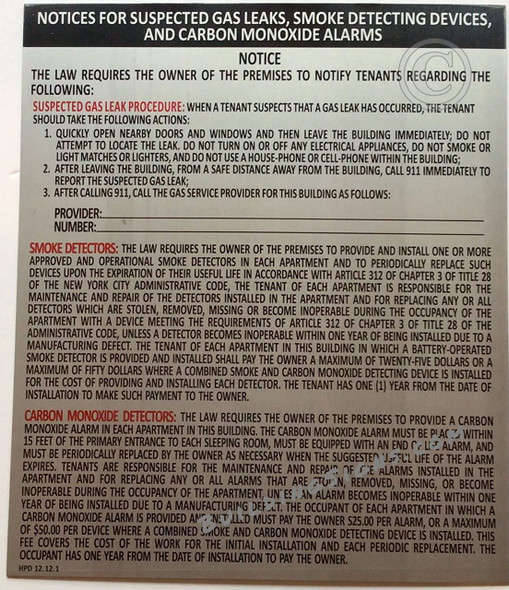HPD NYC HOUSING INFORMATION GUIDE- ABC OF HOUSING SIGN (SILVER . 8.5X11 INCH,DOUBLE SIDED TAPE, RUST FREE, ALUMINIUM)-The Poo Line
- Availability:
- USUALLY SHIP WITH IN 1-2 BUSINESS DAY
Description
About this item
HPD NYC HOUSING INFORMATION GUIDE- ABC OF HOUSING SIGN
Size:8.5x11INCH Silver RUST FREE- ALUMINIUM COMMERCIAL USE,Double sided tape, DESIGNED TO LAST
The Importance of Posting NYC’s Housing Information Guide for Tenants and Owners
New York City’s housing laws are designed to protect both tenants and property owners by ensuring they have access to essential information regarding their rights and responsibilities. One of the key requirements under NYC Administrative Code § 26-1103 is the mandatory posting of the housing information guide, commonly known as The ABCs of Housing. This guide serves as a crucial resource for residents in multiple dwellings, offering insights into the rules and regulations that govern housing conditions, tenant rights, and property owner obligations.
Legal Requirement to Post the Housing Information Guide
According to NYC Administrative Code § 26-1103, property owners of multiple dwellings are required to post a Housing Information Guide for Tenants and Owners in a conspicuous place within view of the area where mail is delivered. This ensures that tenants and building residents have easy access to vital housing-related information at all times.
Failure to comply with this requirement may result in fines and penalties, reinforcing the city’s commitment to making housing-related information readily available.
What is The ABCs of Housing?
The ABCs of Housing is a comprehensive guide published by the New York City Department of Housing Preservation and Development (HPD). This document provides critical information, including but not limited to:
- Tenant Rights and Protections – Rent stabilization, lease agreements, eviction protections, and security deposit regulations.
- Landlord Responsibilities – Building maintenance, safety regulations, heating and hot water requirements.
- Housing Violations and Complaints – How tenants can report issues such as lack of heat, pest infestations, or unaddressed repairs.
- Legal and Financial Resources – Available assistance programs for tenants facing financial hardship and landlord resources for compliance.
Why Posting the Guide is Important
- Increases Awareness and Accessibility
By posting The ABCs of Housing in a visible location, tenants can easily access crucial information without having to search for it online or contact city agencies.
- Helps Prevent Legal Disputes
Many disputes between landlords and tenants arise due to misunderstandings or lack of awareness about housing laws. Having this guide readily available can help clarify rights and responsibilities, reducing potential conflicts.
- Encourages Compliance with Housing Laws
Landlords who comply with posting requirements demonstrate a commitment to following NYC’s housing regulations, fostering a better relationship with tenants and avoiding penalties.
- Provides Guidance on Housing Issues
From repairs to rent regulations, the guide covers a wide range of housing-related topics, empowering tenants to take appropriate action when necessary.
How to Comply with NYC Administrative Code § 26-1103
To meet the requirements of NYC’s housing code, property owners should:
- Obtain the Latest Version of The ABCs of Housing sign – from the official store hpdsigns.nyc
- Post the Guide in a Conspicuous Location – This must be in a common area where tenants receive mail, such as the building lobby or mailroom.
- Ensure Readability and Accessibility – The guide should be clearly visible and not obstructed by other postings.
- .
Conclusion
Posting The ABCs of Housing in accordance with NYC Administrative Code § 26-1103 is a simple yet essential step in ensuring that tenants and property owners have access to the information they need to navigate the city’s complex housing regulations. Compliance with this law promotes transparency, reduces disputes, and fosters a well-informed community. Property owners should take proactive measures to display this guide in a highly visible area, ensuring that every resident benefits from the knowledge it provides.
DISCLAIMER DISCLAIMER ON LEGAL CODES DISCLAIMER ON SIGN USE GENERAL INFORMATION DISCLAIMER
We are a small, family-owned and family-operated Brooklyn-based business. We are not a City of New York store, nor are our website, products, or services affiliated with the City of New York or any agency of the City of New York. Neither we, nor our business, websites, products, services, or any hyperlinks from our website are sponsored by, approved by, affiliated with, endorsed by, or connected to the City of New York or any agency of the City of New York, including but not limited to HPD, DOB, DOT, DSNY, FDNY, or any federal entity, directly or by implication.
The codes, regulations, and requirements referenced on our website may not represent the most recent or updated versions. State, federal, or local regulatory agencies may have more current or accurate information. We make no warranties or guarantees about the accuracy, completeness, or adequacy of the information provided on this site or linked from it. Customers should verify all information by reviewing the official sources directly.
The requirements for sign content depend on intended use and applicable laws. The buyer is solely responsible for determining the appropriate content for a sign or package of signs. We make no warranty or representation regarding the suitability of any sign for a specific application. It is the customer’s responsibility to ensure that the signs ordered are in compliance with all applicable state, federal, local, and municipal laws. Customers are encouraged to carefully review our Terms and Conditions prior to purchase.
All content on this site is provided for informational purposes only and does not constitute legal advice, professional advice, or a definitive statement of law. For guidance on specific requirements, customers should consult the laws and regulations referenced, as well as any rules applicable in their jurisdiction. You may wish to consult with an attorney or qualified professional to ensure compliance with all applicable legal obligations.



















